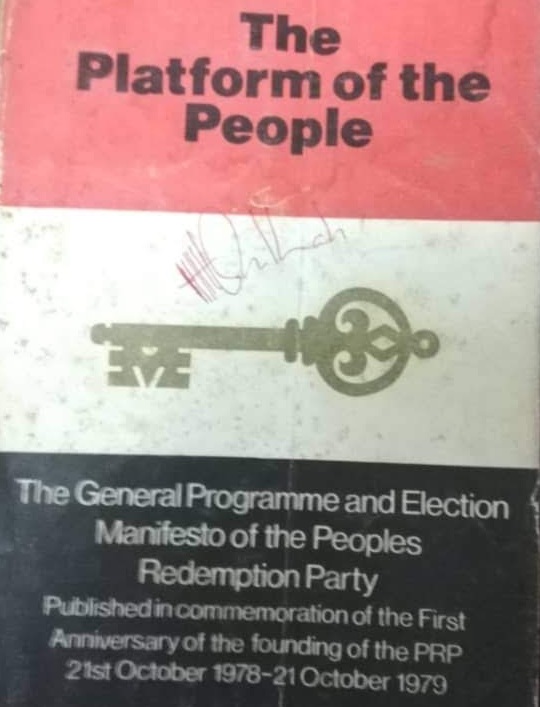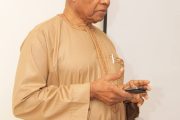At a time like this, there should be a force for good waving a banner of hope as majority of the people waft into submission to an overwhelming abnormality. Nigeria is under siege from a deep crisis of state. That is the lawlessness prevailing now, with the risk that popular psychology is almost internalising it by the day. There is almost nothing that could go bad that has not gone bad. To make matters worse, the government in power is never going to re-invent itself.
In the midst of this, there should be a voice with the antecedent, legitimacy and, above all, packaging capacity to be clarifying and conscientising. There are groups, caucuses and platforms already carrying out national level conversations on the crisis. That is a beautiful paradox of this highly unhappy time.
What is missing is a more pungent mediation of the North’s share of the anarchy which is substantial. Like the rest of the country, the North is totally fragmented along class, ethno-religious, gender, generational and ideological lines. Its own share of the fall out of corruption is gargantuan. Innovative leadership is difficult to find. Nobody has been mobilising anybody on any substantive popular, democratic aspirations.
But reality is what we make of it. Society must be mediated. Mediation of reality is, therefore, very important, precisely because it is one thing for outrageous things to happen, it is a completely different thing how outrageous things are mediated. Narrativisation is thus the immediate challenge of the insecurity crisis because nothing can be accomplished without, first and foremost, such a meaning condensing exercise. Narrativisation is a difficult thing. It is not an all comer task because it starts from ‘how’ rather than from the ‘why’ question.
Thus at stake here is rather the question as to whether the rump of ‘the radical tradition in the North’ can rise in terms of distinctive framing of the crisis enveloping Nigeria, the North’s share of which is substantial. There is the radical tradition in the North if we follow the late Prof Ahmadu Jalingo in his definition of that tradition as the tendency that thought of social change in the North in terms of rapid transformation as canvassed by the Northern Elements Progressive Union, (NEPU) under the conditions of the immediate post independence politics. The opposite of the radical tradition is the conservative position which favoured gradualism in modernization as advanced and defended by the Northern People’s Congress, (NPC) during the same period. Both traditions have survived to this day.
But it has been the radical tradition that the region has always fallen back on for safe landing when the country has been in a T-Junction. The reforms the NEPU and its reformers canvassed were the reforms that saved the system or helped to stabilize it at every turn, ever since independence, the details of which need not detain us at this point since that’s not the substantive issue. Much of the reforms in education, local government, party system and expansion of the political space are traceable to this tendency.
Now, the challenge is about distinctive framing of crisis, popularizing such framework of the crisis as for it to become the consensus and then the frame of reference in terms of an informed regional response. Can this happen and happen quickly enough?
This question has its roots in the diversity of positions coming out of the region which is at the same time the hub of insecurity in the country, from the Northcentral to the Northwest and, of course, the Northeast. Whether these insecurity challenges can be conceptualised in regional terms in the age of de-territorialisation when nothing can be traced to specific territories would be an interesting angle. Perhaps, it makes sense to still talk of the North, East or the West in so far as people still experience those spaces specifically in spite of the fluidity of flow.
All manner of surrogate platforms are talking at the same frequency as top traditional cum religious leaders, elite camps and political leaders. It has been a perfect case of a divided house in which no centre of gravity in the last instance can be observed. While the diversity that even the very limited modernity in Nigeria has occasioned makes the case of centre of gravity tenuous, the challenging nature of the security situation makes it crucial. Leadership in terms of successfully framing the crisis is thus what the North is desperately lacking, a challenge which calls to mind the role of the radical tradition as a distinctive tendency in the context of the region.
Talking about the radical tradition necessarily privileges the People’s Redemption Party, (PRP) in its generic sense and in its empirical self today, being the uncontested inheritor of the legacy. Can it save the situation in a distinctive manner and save the region from the paradox of the democracy of voice – everybody is talking to no one in particular, meaning no one is listening.
As a product of a clear legacy, the PRP has an identity advantage in trying to plunge into situating what is happening. But as an actually existing party, it has its challenges with particular reference to coming to grips with that challenge. It would seem that the PRP can attempt this, with great prospects of acquiring the status of primacy from doing so. A lot will depend on what it brings to the framing game.
This is not to fail to reckon with the PRP’s current possible state of existence. For all we know, the PRP might be undergoing its own internal tension. It has just lost it long time informal leader and tension around filling that position might not be ruled out. At a point, it was even strongly speculated that Senator Rabiu Musa Kwankwaso was bidding a take-over. Senator Kwankwaso is mentioned here not in and of himself but as a signifier for what could happen in the question of the emergence of a successor to Alhaji Abdulkadir Balarabe Musa, the long time informal leader of the PRP. There might have been no such intention on the part of Kwankwaso but that speculation was a pretty strong one in the aftermath of the demise of Alhaji Abdulkadir Balarabe Musa. Well connected sources were sure that is the agenda behind Nasara Radio belonging to the Senator, complete with the key as its symbols just as the PRP.
So, there could be all manner of such problems, none of which should, however, be new to a tendency shaped by repression, crushing and splits, meaning there should be nothing on the ground to stop the PRP from speaking. This is a case of reckoning with a named actor with moral authority on the issue. A voice is needed which would provide a rallying point for other voices on account of its penetrating force; on the strength of its legacy and its promise of a future. It is not every political personality, platform or group that has the legitimacy and stature to provide THIS voice.
If we are looking for a global best example of this, no better one may exist beyond China where the Communist Party has just mediated social transformation of unspeakable magnitude. At the local level, there might be no better example than the Southwest of Nigeria which has been mediated by a select club of intellectually endowed few. The North did have an intelligentsia but which ran out of gas. It is presently not being mediated at all.




























